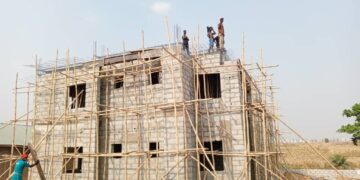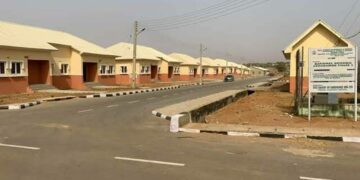The Managing Director and CEO of the Oil and Gas Free Zones Authority (OGFZA), Bamanga Usman Jada has asserted that Nigeria’s Free Trade Zones (FTZs) do not result in revenue loss for the governments at the various levels in the country,
The OGFZA also clarified misconceptions about these zones being mere tax havens for investors. Instead, he emphasised their role in generating significant foreign direct investment and supporting economic growth through job creation and infrastructure development.
Speaking when the management of LEADERSHIP Group, led by its vice chairman, Mike Okpere, presented the nomination award for ‘CEO Public Sector Of The Year 2024’ to him in his Abuja office, on Monday, Jada noted that rather losing revenues, the country gained a lot from special trade zones in terms of attraction of foreign direct investment, job creation, technology transfers, among others, which when quantified is higher than whatever taxes such companies would have paid.
Jada noted that a lot of people have no idea on the recent reforms by President Bola Tinubu’s administration.
“There is a lot of misinformation, people that don’t have a real understanding of how the Special Economic Zone’s concept works.
“They think people are losing revenues through the Free Zone concept. anyone that really understands the concept of Free Zone, there is nothing like revenue loss. In fact, it is a big win for us, because if you have a location that nothing is there, and you are able to use the location to attract investors to come and set up their production platform, what you achieve is, you achieve putting infrastructure in that place that was not there before.
“And all these production platforms are coming with benefits. What are the benefits? Employment to the local people. Skills to the local people.Technology transfer to our local people.”
According to him, taxes are a different form. There are taxes that people collect, physical cash, taken to the consolidated revenue account for all to use as well as in terms of technology transfer, like my earlier statement has mentioned, the skills, the infrastructure, the CSR that comes with it, these are the benefits. If you quantify it, it is even more than the profits that can be declared.
According to him, “People look at removal of subsidies on PMS and the streamlining of the currency are ways to punish people. But there is a consensus among the global policy makers that the healthiest subsidy to give to the citizenry is a subsidy on productivity. And the concept and the model of free zones, special economic zones, is purely a subsidy on productivity. What is it coming with? Incentives that have to do with exempting companies from paying taxes and import duties. What attracts foreign direct investors is that when you are coming into the country to set up your production platform or plan, the cost of setting it up is a factor.
“So if you are coming to the free zone concept, everything you are bringing in is coming under import duty free. That means all the equipment, the machinery you need to set up your production platform is coming under import duty free. Because of that, the cost of setting it up will be lower. And if you are making your own production within the free zone, you will be exempted from paying taxes. It will make you more competitive. And if you are more competitive, your prices will be lower.”
The OGFZA boss also said that in all where the organisation has a presence, there are no locations that have businesses before. “They are locations that were bush, swamps that have been transformed into economic hubs. And globally, it has been proven that this special economic zone concept, the free zone concept, is the most efficient and effective tool that can accelerate economic growth and development to achieve larger economic upscale through industrialisation.
He noted that under the Liberty Oil and Gas Free Zone, “We have a project that is coming on board called Alternative Energy and Power. They are to produce 348,000 metric tons of green and blue hydrogen. That project alone is capable of turning Nigeria into the center of green and blue hydrogen in the whole of Africa.The worth of that investment is over 8 billion euros. So if you calculate, it is more than the $10 billion US dollars that we are talking about.
“And the 50,000 metric tons is a facility, an LPG warehouse, storage facility in Onne, River State. And the 20,000 metric tons is in Liberty oil and gas at Akwa Ibom. So that project is critical to support the clean cooking project. And it will aggregate all the LPG that have been produced in the zone.
We’ll be able to have where it can be stored, it can be warehoused, it can be used for export, because our zones are strategically located, we can export it. And we will also support the local market, that is the Custom territory.
The OGFZA aims to enhance public understanding of FTZs as vital economic drivers rather than revenue drains, asserting that these zones foster industrialization and technological advancement.
As Nigeria continues to navigate economic challenges, the government views FTZs as essential to attracting investment and boosting exports within the African Continental Free Trade Area framework.





